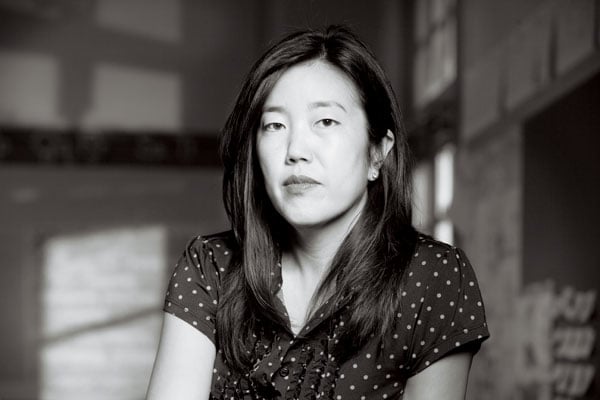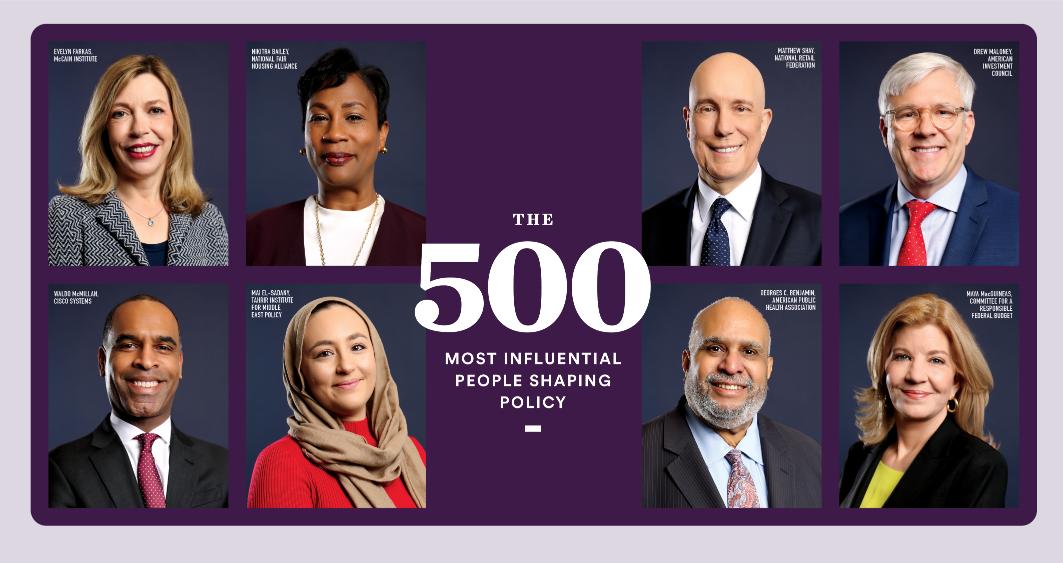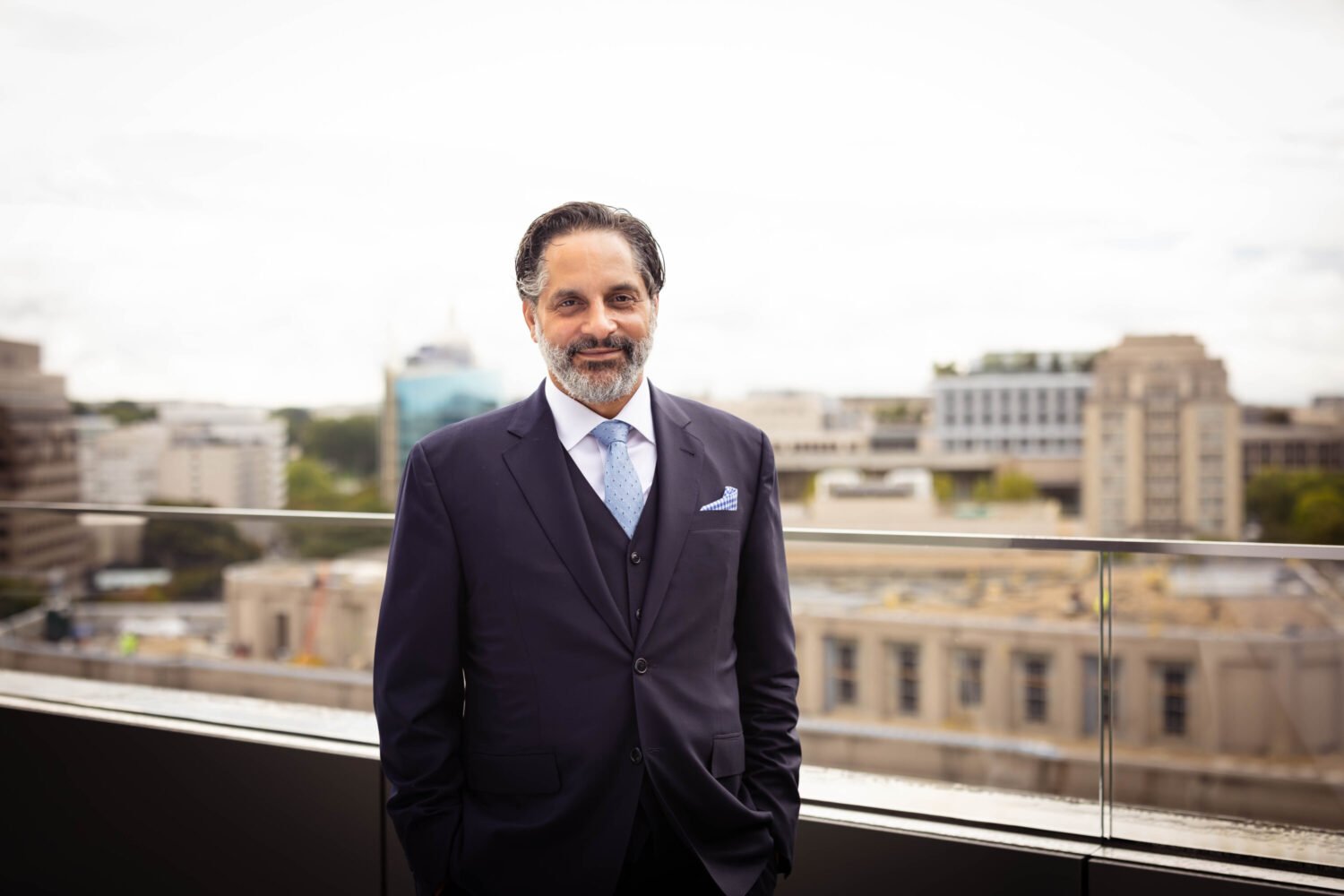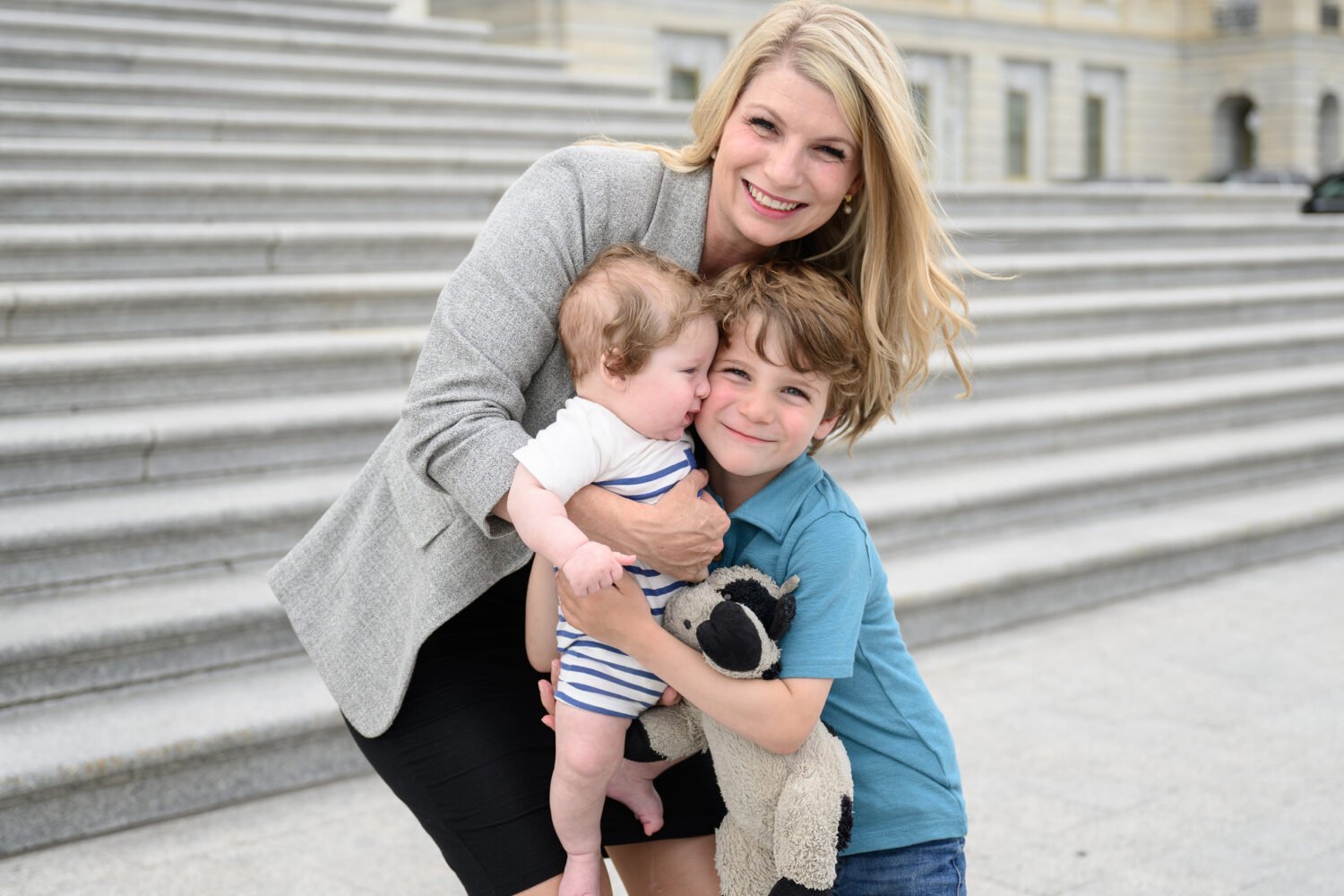Oak Hill Youth Center at 7 am looms out of the morning mist with the foreboding feel of an abandoned penitentiary.
“Looks like Halloween, the horror movie,” says Mafara Hobson, the escort for my day with Michelle Rhee.
Less than 24 hours ago, the DC Council confirmed Rhee as the District’s first school chancellor, charged with transforming a system that has defied change for at least four decades. She will start her first official day at a jail for the city’s most troubled kids and end it at a dinner at the Georgetown home of a venture capitalist.
Rhee is in the back seat as we find our way to Oak Hill in Laurel. During the 45-minute drive from her temporary home near downtown DC, she has sent e-mails from her two BlackBerrys and her laptop, interviewed a prospective assistant, done a radio interview, and attempted a few more e-mails but failed.
“Our system is down again,” she says.
Welcome to the District of Columbia Public Schools.
We park in the jail’s gravel lot. Rhee looks up at two parallel chainlink fences, each 30 feet high and topped with seven coils of concertina wire. Her black heels crunch on the loose stone. I ask if more staff members will be arriving.
“I am my own entourage,” she says.
At the security desk Rhee shows her identification and passes through the metal detector. We go through a series of metal doors that lock behind us with a sharp crack. Rhee smiles when she sees the kids.
Teenagers in color-coded T-shirts are lining up in front of an assembly hall. They are barely awake, stone-faced. They are in for everything from petty crimes to carjacking to assault with intent to kill. They file inside and sit in folding chairs facing a stage.
Michael Jackson’s “Thriller” is blasting from speakers. Aides and interns with the Freedom School, a charter school just starting up at Oak Hill, are dancing and twirling and clapping.
“G-O-O-D good morning,” they chant, and sing a song with the refrain “something inside so strong.”
Michelle Rhee enters and spots two boys sitting in the front row. One has an Afro, the other dreadlocks. She walks over, sits down, crosses her legs.
“Hi,” she says, “my name’s Michelle.”
Darren and Gerrard introduce themselves. “Why are you here?” one asks.
“I am the new chancellor of the city’s schools,” she says. “Why are you here?”
They say they were driving a car without a license, but the car was “legit.” Must be more than that, she says. They got into some trouble at school, they admit.
“Are you married?” Gerrard asks. “You’re pretty.”
Rhee is wearing a dark-blue, V-neck summer dress with white accents and red lipstick. Her black hair falls to her shoulders.
“What do you want to do when you grow up?” she asks.
“I want to be a teacher,” Darren says. “What will that take?”
“You have to go to college,” she says.
“For how long?” he asks.
“Four years,” she says.
“I can do that,” he says.
Rhee is called to the stage, introduces herself, and reads a poem titled “Just Me.”
Before she leaves she exchanges e-mail addresses with Darren and Gerrard.
Walking back through security, I ask how she would educate the kids who wind up in Oak Hill.
“They don’t need to be in there,” she says of the two boys.
What about the angry-looking teenagers in the back rows, some there for committing violent crimes?
“I would teach them life skills so they don’t get into that situation,” she says. “Those kids have tremendous potential.”
She says she made a promise to Darren: “Graduate from college, keep in touch with me, I’ll hire you.”
The Oak Hill visit is trademark Michelle Rhee: Wade in, no filter, no supporting cast, make contact, listen, learn, leave a new set of converts.
“She’s an impressive young woman,” Vince Schiraldi tells me after seeing her in action at Oak Hill. Schiraldi directs the District’s Department of Youth Rehabilitation Services and oversees the jail. “I believe she can help these kids and make our schools work for them.”
Washingtonians have drummed up optimism for new school leaders six times in the last ten years. There were Becton and Ackerman, Smith and Vance, Massie and Clifford Janey, the superintendent who was told to leave in June.
General Julius Becton enlisted the Army Corps of Engineers to repair the schools. It failed. Franklin Smith promised to empower principals and parents. He made some inroads. Like Rhee, Janey vowed to audit the system’s finances; they remain in disarray.
Why would anyone—student, teacher, principal, or parent—believe for a DC minute that Michelle Rhee can succeed?
What’s changed is that, for the first time in decades, the gears of government seem to be aligned for true change.
Mayor Adrian Fenty’s first act in January was to introduce legislation that would bypass the Board of Education and give him control of the schools. Preaching accountability, he staked his political future on a promise to improve schools that have turned out too many children unprepared to join society, let alone the workforce.
Fenty has risen through DC’s political ranks at the same time that a reform movement powered by fresh, young teachers has started to have an effect in cities across the country. The Teach for America program has attracted idealistic college graduates who want to contribute two years to improving the nation’s schools. Some have stayed with teaching, seeding improvements in public schools and spawning new programs.
Michelle Rhee came through Teach for America and then founded the New Teacher Project, becoming a recognized leader of the national reform movement.
Fenty pushed his takeover proposal through the DC Council and Congress and took over the schools on June 12. The Board of Education, known for meddling and blocking reform, became an advisory body.
The Washington Teachers’ Union, another traditional impediment to change, is in a weakened state. Rattled by a corruption scandal that sent former union president Barbara Bullock and two assistants to jail, union leaders seem to be in a mood to cooperate.
The central school bureaucracy is also vulnerable to change. Fenty has sent outside experts to organize the system’s finances. His demand for accountability has to overcome a bureaucracy known for lassitude and nepotism.
Fenty promised a public search for a chancellor to run the schools, but in his trademark impetuous fashion, he made a gut decision that Michelle Rhee was the person, convinced her to take the gamble, and announced her nomination on June 12, bypassing his own process.
To some, his choice seemed precipitous, maybe foolhardy. How could Rhee, a 37-year-old Korean-American from Toledo with no experience running a school system, be expected to manage an urban district with a 82-percent African-American student population and a $1-billion-a-year budget?
Since June 12 Rhee has met many critics and turned them into supporters. She has connected with students in Anacostia and wealthy businessmen on K Street. She has visited schools, attended community meetings, been invited into homes. Now comes the hard part.
Nothing guarantees that Rhee will survive the political pitfalls of closing schools, choosing principals, and firing workers. Or failing to meet the high expectations. Every superintendent, Janey included, has vowed to tame the bureaucracy and improve student outcomes.
“She’s got all the right ideas, a wonderful attitude, and she’s open,” says Mary Levy, an authority on school governance with the Washington Lawyers’ Committee for Civil Rights and Urban Affairs. “I worry about her being undercut or overwhelmed.”
Driving down Route 1 from Oak Hill, Hobson’s Ford Explorer gets caught in morning traffic. Rhee is scheduled to run a 9 am meeting of her opening-day task force. We head into a turn lane and ride by a Maryland trooper stopped dead in traffic. Rhee hates to be late. Or unoccupied. Her fingers tap away on her laptop.
I ask if she’s been to all of DC’s neighborhoods.
“The night before my confirmation hearing, I took a tour of Anacostia,” she says. “A driver from the school system drove me past most of the school buildings. You look outside and see the bars on the windows and the trash in the back and the peeling paint. No one wants to send their kids there. They look like jails.
“It put me in the mindset for why I’m doing this,” she says—then goes back to her laptop.
We arrive at DC school headquarters at 825 North Capitol Street at 9:05. Rhee stops by her office and tries to get e-mail.
“I’ve never been in a place where the server is down so much,” she says.
Thirty school administrators are waiting in the conference room adjoining her office. She steps through the door and sits at the head of the table. The meeting is being run by a consultant, who turns the meeting over to the chancellor.
“In my visits with high-school students,” she says, “I learned one thing: They want to feel welcomed on opening day into clean schools where someone actually says ‘Come on in’ and smiles.”
This is the no-nonsense Michelle Rhee, her eyes narrowed, her lips tight. Her voice is low and firm.
She tells the bureaucrats that in past meetings they have presented her with “dog-and-pony shows.” Those days are over. “We have to be more data-driven,” she says. “What are you going to deliver and when?”
Many of these people are the ones who have failed to deliver books on opening day. Who cannot count students, fix bathrooms, pay teachers. They stare at Michelle Rhee and take notes.
The consultant uses a PowerPoint program to show them what is expected and how they will be held accountable. Rhee listens. He asks if she has anything to add.
“I’m good,” she says and leaves.
In her office she tells me a story .
On one of her first days in the building, a meeting was canceled, and she had an hour of free time. She took the elevator down a few floors, got off, walked the hall, knocked on a door, and introduced herself to the person at the desk.
“What do you do?” Rhee asked.
The official recited her title. Rhee asked what she actually did. She said she did whatever her immediate superior told her to do.
Rhee tells me, “That has to change. Every person in this building has to be performing a task, not having a title. And each person has to be held accountable for performing their tasks.”
Skeptics point out that Rhee has no management or business experience. Charlene Drew Jarvis, a former DC Council member and current president of Southeastern University, says Rhee’s early actions show just the opposite.
“She clearly knows business practices,” Jarvis says. “Business practices are about accountability—making sure your employees know what is expected of them and holding them to it. Are they engaged in activities or outcomes? She’s clearly engaged in the latter.”
At a July community meeting, at Kelly Miller Middle School at the city’s far east corner, Rhee says she knows the central office has been sabotaging change.
“They have treated questions from teachers and parents as a nuisance,” she says. “Their job is to serve parents and teachers. Too often the central office has been a hindrance rather than a help.”
Maybe so, but the bureaucracy has outlasted more than a dozen superintendents. What makes Rhee think she can survive?
“If deception and delay are all they have to break Michelle Rhee,” she says, “they will find I am a resourceful woman.”
She is a daddy’s girl.
“My dad was a huge influence on my life,” she says. “He is so far from the typical Korean guy his age. They tend to be disconnected, very strict. He’s vibrant, he’s athletic, he skis. He’s a daredevil type. Stick him in a room anywhere with anybody, and he can have a conversation. People just love him.”
Shang Rhee, 68, is a doctor. Born in Korea, he came to America in 1965 and settled in Toledo. His wife, Inza, owned and ran a clothing store. Michelle Rhee is the middle child between two brothers. Her father always encouraged her to do community service.
“He wanted me to know that it wasn’t because I was all that smart or all that great that I had all the privileges I had but because I was lucky enough to be born into this family. But for kids who grew up in poor families, it wasn’t because they weren’t smart or were less deserving that some had difficulties.
“It made me want to fight for the underdog,” she says.
Rhee describes a close family that lived in a nice suburb, ate dinner together, took family vacations. “We had fun,” she says.
When she finished sixth grade, Rhee spent a year in Seoul going to school and learning Korean. She calls herself “conversationally fluent.”
As a teenager she worked with children and spent one summer on a Native American reservation but never planned to devote her life to education. Her family expected her to become a lawyer.
When she was a senior at Cornell studying government, she saw a PBS special on Teach for America, a program that recruits the brightest college graduates to teach in urban schools. The year was 1992.
“I saw young people my age trying to change the world through education,” she says. “I said to myself, ‘I can do that.’ ”
Her parents were not thrilled. She was accepted into Teach for America—and into graduate school. She couldn’t decide. She called her maternal grandmother in Seoul.
“Go be a teacher,” her grandmother said. She had been a teacher.
“But it’s going to be really hard,” Rhee said. Her grandmother didn’t know she would be going into tough urban schools.
“What’s hard about little kids?” she said. “Quit boohooing and do it.”
“So,” Rhee says, “I did.”
Around noon Mark Lewis, a teacher at Ross Elementary near Dupont Circle, walks down the hall toward Rhee’s office. He’s carrying a briefcase. He’s wearing jeans and an open-collared shirt. No jacket, no tie, cropped gray hair.
Rhee and Lewis sit at the round table in her office and talk about how to teach reading, about phonics and training teachers and measuring progress and inspiring children.
Says Lewis: “A bad teacher in first grade who fails to teach a student how to read leaves a scar for the rest of their lives.”
Says Rhee: “The war is won in the classroom. It’s all about leadership.”
This is where Rhee lives—in the classroom, making the connection between the teacher and the student. After the meeting with DC schools staff, she spends the morning talking to consultants from the Discovery Channel and representatives of the College Success Program, a nonprofit distributing $122 million of Bill Gates’s foundation money to send DC kids to college. She listens, she interacts, she’s cordial—but she cuts loose when she talks about classroom teaching.
Her first year of teaching was a disaster. After a brief training period with Teach for America, she was assigned in 1993 to a second-grade class at Harlem Park Elementary, in a tough Baltimore neighborhood. Her students were the system’s lowest in behavior and achievement.
“I did not do right by the kids,” she says. “It was rough going.” She says she couldn’t control the classroom; she spent her time disciplining, not teaching; she finished the year demoralized. She said to herself, “I’m not going to let eight-year-old kids run me out of town.”
She spent that summer planning lessons and figuring out ways to get her students to care about achievement. She took more courses and got her teacher certification. She went back to Harlem Park.
“The bottom line is that there’s no silver bullet in what made me successful,” she says. “I had high expectations for the kids, and I communicated that to them all the time. I invested them in our joint success.”
She showed her students their low ranking and challenged them—and their parents—to work hard and raise their scores against other classes and other schools.
When Rhee assigned two hours of homework a night, some parents said it was too much to expect of eight-year-olds. Rhee argued that doing homework was time better spent than hanging out, playing video games, or watching television. She spent hours preaching education to parents and community leaders.
“We worked harder and longer than anyone else,” she says. “Before school, after school, weekends. No silver bullet. It was sweat.”
And it was successful. Test scores for Rhee’s students jumped. Her experience informed her core belief: One adult, in the form of a committed and empowered teacher, can change a child’s life no matter how bad it has been.
After a third year with Teach for America, Rhee started the New Teacher Project in 1997. She spent the next decade building it into a nationally recognized organization at the forefront of education reform. She consulted with big-city school districts from Oakland to New York. The group recruited more than 23,000 teachers willing “to work hard and sweat” in inner-city schools.
Over dinner one night I ask if she still believes that bringing great teachers into the classroom can turn around a child, a school, a system.
“Absolutely,” she says. “You can say what you want about the home environment. The bottom line is that I know success stories where parents didn’t change, home life didn’t change, tough-streets life didn’t change. What changed was the adult in front of them every day in the classroom.
“These external factors don’t have to define achievement for our kids. If a prospective teacher wants to come up with a laundry list of why kids are failing because no one is reading to them at night, they can go teach in Fairfax County.”
How will she find these teachers?
“They are out there,” she says. “There are only 4,500 teachers in our system. There are 74,000 in New York City public schools. Besides, there are a lot of teachers in our system right now doing a great job.”
Which is why Rhee has brought Mark Lewis into her office.
A teacher in DC schools for 15 years, Lewis was teaching reading at Ross Elementary, where he and a corps of teachers were working with parents to raise test scores. One day in July he sent an e-mail to Rhee about training teachers for reading and writing classes. A half hour later she responded and suggested they meet.
“I was shocked,” Lewis says. He had tried to make contact with school officials in the past; “I never got a call back.”
Now he was sitting with the chancellor, she was taking notes, and they were making plans to stay in touch.
Rhee says her first meetings with parents, teachers, and students encouraged her to be responsive. “The most disheartening thing for parents and students was that no one returned their calls,” she says.
Says Lewis: “I’m not the only one contacted by her and her staff. They must be working 25-hour days.”
When Adrian Fenty took office as mayor in January, Michelle Rhee was living in Denver. She had never met Fenty—never even heard of him.
In the ten years she spent developing the New Teachers Project, Rhee had led a nomadic life. After Baltimore, she spent two years getting a degree from Harvard’s Kennedy School; she taught in Jersey City; she lived in Silver Spring with her husband, Kevin Huffman, a lawyer, and their two toddlers; she moved back to Toledo to be close to her parents; then, with her family, followed her retired parents to Denver.
At the end of May she was in New Orleans at a meeting of the NewSchools Venture Fund, where leaders in the school-reform movement gathered. She ran into Abigail Smith, who was working for Fenty’s new Department of Education. Smith and Rhee knew each other from Teach for America.
“Can you help us recruit a chancellor to run DC schools?” Smith asked.
Rhee gave her the names of four promising candidates. The next day Victor Reinoso, Fenty’s point man on the DC schools, introduced himself to her.
“How about you as our school chancellor?” he asked.
“Absolutely not,” she said. “I am raising two great kids in Denver. I’ll help you find the person and help recruit teachers. That’s it.” And she went on with her travels.
Smith called and asked Rhee to meet with Fenty in Washington. She agreed on the condition that she was representing the New Teacher Project, not herself as a candidate for chancellor.
Before meeting Fenty, she went to New York to receive an award for her work in education. She sat next to New York school chancellor Joel Klein. She had consulted with Klein and Mayor Michael Bloomberg on reforming New York schools and had recruited teachers for the system. Klein and Bloomberg were major influences in Fenty’s drive to take control of DC’s schools.
At the award ceremony, neither Rhee nor Klein mentioned Washington. But the next day, Klein called Fenty and said, “Michelle Rhee would make a great chancellor.”
Rhee met with Fenty and his top education aides. Fenty didn’t have much to say at the meeting; it was not an interview. Rhee came away thinking Fenty was a nice guy.
Fenty called Klein, told him about the meeting and said, “She’s the one.”
Fenty then asked Rhee to meet with him one on one. This time he asked her to take the job. According to Fenty and Rhee, the conversation went like this:
“You don’t want me to take this job,” she said.
“Yes, I do,” he said.
“Your job as a politician is to keep the noise down,” she said. “I am a change agent. There is no change without pushback.”
“If what you do is in the best interests of the kids,” he said, “I don’t mind the noise.”
“Why me?” she asked. “In any world, it doesn’t make sense.”
“I’m looking for someone who has passion for educating children and will work long and hard to improve achievement.”
“What would you risk for a chance to turn this system around?” she asked.
“Everything,” he replied.
Minutes after Mark Lewis left Rhee’s office, a reporter from a Korean newspaper arrived to interview her.
Rhee still has strong connections to Korea. Besides spending a year there, she has family in Seoul, and her younger brother has settled there to pursue an acting career.
When Rhee told Fenty that his choice of her “doesn’t make sense,” she was referring in part to the challenge of her leading a school system that is predominantly African-American.
Rhee was worried enough that she put the question to Kevin Johnson. She had met “KJ,” the former NBA star with the Phoenix Suns, through his work in his hometown of Sacramento, California, with the nonprofit St. Hope Corporation. He had sought Rhee’s help in working with inner-city students, and they had become friends.
“I’m worried about how I will come off in a black city,” she said. “Will race become a problem?”
“Absolutely not,” KJ said. “It will be a nonissue. In the larger African-American community, I guarantee you, Michelle, being Korean is the last thing you have to worry about. You connect with people. They will know immediately you are out for the best interests of their children. African-American families want the same for kids that everyone else would want: high-quality education and access to the best opportunities possible.”
So far Johnson’s assessment has been mostly accurate. Rhee has met with white and black, rich and poor, friend and foe—and won virtually everyone over. She hugs people and preaches the hard work of educating children.
To Rhee’s advantage is the way she presents herself. A slight, attractive young woman, she shows up by herself at potentially contentious gatherings. The effect is disarming. At the Kelly Miller Middle School, facing a predominantly African American and somewhat skeptical crowd, she sat alone at a table on the stage. She looked demure and vulnerable rather than pretentious and commanding. She fielded questions for more than an hour—and won a roomful of supporters.
Rhee has had perhaps the easiest time connecting with Washington’s business elite. The day I spent with her she made an afternoon visit to the Federal City Council, which represents the region’s most influential business leaders.
Seated at the center of one side of the 20-foot conference table, Rhee appeared totally at ease. Fifteen members of the council had come to meet her. They asked if she would have to trim the central office.
“You might be a nice person,” she said, “but if you can’t deliver in a measurable way and be accountable, this is not the place for you.”
How could they help?
Rhee said she would need human-resources assistance in reducing the DCPS staff and finding the best replacements. She might need legal help negotiating a new contract with teachers. “The corporate world will be our model,” she said.
It was music to the ears of the business and education heavies around the table. Going back to the late 1980s, when the Federal City Council’s Terence Golden created the Committee on Public Education, business leaders have been trying to have an impact on DC’s public schools.
The Federal City Council had been thwarted until the past few years, when it brought Victor Reinoso on staff to focus on education. Reinoso, with Adrian Fenty’s backing, won a seat on the Board of Education in 2004. Fenty then chose him to be deputy mayor for education, providing a direct link between the business elite and city schools for the first time.
Reinoso sat next to Rhee at the meeting. Terry Golden was not at the table, but the session was a mark of his success. A Texan who worked with H. Ross Perot to reform Texas schools in the 1970s, he has mixed public service with success in business.
“We don’t view ourselves as leading the reform effort but supporting that effort,” Golden said in an interview. “We never felt we had a partner in our education efforts like we do now in Michelle Rhee and Adrian Fenty. For the first time there’s pretty good alignment in the city.”
At the Federal City Council meeting, Rhee said she wanted every graduate of DC public schools to be prepared for college: “I want to give everyone a run for their money—private schools, charter schools, suburban schools.”
The business leaders asked Rhee how she would handle the teachers union.
The current collective-bargaining agreement expires this fall, she said, and she is talking to union leaders about a one-year extension so they can “craft a model agreement.” She said parents in Northeast DC asked if teachers could work longer hours. Parents in Northwest wanted to know if some teachers could be fired. Rhee said talented teachers would be rewarded—a slippery slope toward merit pay.
Negotiating a contract that would reward teachers, add to their workload, and let some go would have seemed impossible a few years ago when the Washington Teachers’ Union was dominant. But at this point, Rhee and the union are at peace. WTU president George Parker testified on Rhee’s behalf at her confirmation hearing.
“I love George,” she tells me. “I respect that guy tremendously. I expect a productive relationship to move the system in collaboration. He’s the real deal.”
But will a union balk at talk of cutting teachers and requiring longer workdays? I put the questions to Nathan Saunders, general vice president of WTU.
“We are neither offended nor intimidated by her language,” he says. “We think some people should lose their jobs in the central office. It could push dollars to the classroom.”
What about merit pay?
“We think good teaching should be rewarded,” Saunders says.
Rhee tells me she asked George Parker whether his union could support the culling of teachers. He told her: “I have no more interest in keeping ineffective teachers than you do.”
It’s 5:45 pm on a day that began at 6 am when Michelle Rhee walked out of her apartment building in high heels, an open laptop in her hands. We’ve been to Oak Hill and the Federal City Council. She’s held half a dozen meetings.
I’m wearing down. She’s talking and writing e-mails. I had a sandwich for lunch. She skipped the meal.
I hear the tearing of a candy wrapper and look up. “Mini health bar,” she says. No breakfast, no lunch, no caffeine. She says she doesn’t drink alcohol.
On an average day, Rhee says she awakes before 6, responds to e-mails, showers, dresses, comes to the office, holds meetings and visits schools, misses lunch most days, sustains herself on dinner. She ends her workday around 10. Then e-mails for a couple of hours.
“I’m lucky if I get six hours’ sleep,” she says.
Rhee says she hasn’t had much luck finding a house to buy in DC that suits her budget, but she is close to making a deal on one in Brightwood, off upper 14th Street. She hopes to move into the house with her daughters, ages five and eight, and send them to the local elementary school. She has separated from her husband, who plans to settle in DC, too.
Rhee will end this first day with dinner at the Georgetown home of Jonathan Silver, managing director of Core Capital Partners. It will be an intimate dinner, where the guests will offer their support.
Silver says it’s off limits to reporters.
What, I ask Mary Levy, are Michelle Rhee’s chances of success?
“I don’t know,” she says.
Levy has been trying to figure out the DC schools since 1980, when her children attended them. Her investigations and published reports have made her the most constant outside observer of the school system. She worked for Terry Golden in forming the Committee on Public Education. She’s been with the Washington Lawyers’ Committee for Civil Rights since 1990.
“I have never figured out why it is so hard to do in DCPS what is absolutely routine elsewhere,” she says. Like ordering books, paying teachers, fixing bathrooms.
Levy agrees that some things bode well for Rhee. “The union’s teeth have pretty well been pulled,” she says. “It doesn’t have the power to stop change anymore.
“But the bureaucracy remains. Previous superintendents have been undercut from above and below. The bureaucracy misleads them; the board restricts them.”
Levy wonders whether DC Council members will play hard-core politics to keep schools from being closed.
“Her chances of success depend on whether she gets support from Fenty and the council,” Levy says. “Fenty has to protect her from the council.”
I put the question to Fenty.
“She can count on me,” he says.
She can also count on plenty of flak. She talks about shaping a lean bureaucracy but has faced criticism for giving fat salaries to her top aides. Fenty is paying Rhee more than $275,000 a year, and she is paying her deputies $200,000 and more.
“If I’m going to turn the system around,” she says, “I have to have great people leading the system. I would ask you to look at the overall expenditures for what’s being provided. I’m not going to be penny wise and pound foolish.”
She’s not foolish enough to predict a quick victory. She talks about “righting the ship” in the first year. She talks about taking eight years to make the school system properly educate kids so it can grow—perhaps to double its size of 55,000.
“Is everything going to be perfect on opening day?” she says. “Not possible. But we will have a smooth opening.”
Maybe—but it will be an opening without enough textbooks. Rhee and Fenty toured a DCPS warehouse with stacks of unopened books to show that the ordering system is broken.
She plans “education transition town halls” across the city to explain the problems to parents and students.
At 8 am on Sunday, July 15, four days after our day together, Michelle Rhee went to Bible Way Church on New Jersey Avenue for the morning service. Bible Way, started in 1957 by Bishop Smallwood Williams, is one of Washington’s bedrock black churches. The morning prayers have been broadcast on WYCB-AM every Sunday for 30 years.
Rhee tries to attend a black church every Sunday. “I think it’s critical to get community investment,” she says. “If I’m going to be closing schools and moving people out of the system, unless I get the community to trust me, to back me, I’m done.”
The pews were full. Bishop James Silver introduced Rhee. She was the only person there who was not African-American. He surprised her by asking her to address the congregation and speak to the radio audience. She walked up the stairs and mounted the pulpit.
“The schools in our city have been failing our children for far too long,” she said. “The only people who have paid the price for these failing schools have been the kids.
“I am committed to changing the way we educate our children. There is no reason why children in Anacostia can’t have the same education and the same opportunities as children in Georgetown.”
The congregation rose and applauded.
“It will require tremendous change,” she said. “I’m going to need the entire community to help me. It can’t happen only within the four walls of the school building. I need to work hand in hand with you.
“I ask for your prayers.”
She will need them.

















